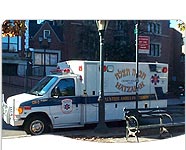 
Survival Equipment, Don't Be Without It!
Anyone driving on remote roads faces the possibility of spending an unplanned night in a vehicle during any season of the year. Bad weather, breakdowns, running out of fuel, and getting stuck are some common reasons why a driver might be stranded overnight. If the driver is prepared, such events do not have to be a life-threatening experience. Therefore, it is always wise to be prepared. Safety preparations for trips include equipping the vehicle with things you may need if you become stranded.
Survival equipment can be kept either in the vehicle's trunk or the glove compartment. You may not need everything these lists mention, but if you are stranded and don't have a particular item, you will wish that you had carried it.
Items to keep in a vehicle's trunk:
- Sleeping bag or blanket(s)
- Space blanket (foil)
- Gloves
- Additional clothing and winter footwear
- Drinking water
- 3 dehydrated meals (e.g., military Meals-Ready-To-Eat, known as MREs)
- 2 empty cans (one for melting snow to drink and one for sanitary purposes)
- Toilet paper
- Bag of cat litter (provides friction should wheels spin on ice or snow)
- Emergency candles and waterproof/windproof matches
- Chemical hand heater packets
- Duct tape
- Red or blaze orange flagging tape
- Folding shovel
- Jumper cables
- Tow chain or rope
- Tire chains
- Repair tools (pliers, screwdriver, adjustable wrench)
- Fire extinguisher
- First aid kit and manual
Items to keep the vehicle's glove compartment:
- Maps & compass
- Snow brush/ice scraper
- Hand wipes
- Flashlight and spare batteries
- Cellular phone with charger
- Reading materials
These items to be do not necessarily have to be stored together. They can also be placed in the vehicle's nooks and crannies not often used for storage purposes.
The items stored inside the vehicle can be nested in a container and also stored in miscellaneous places, such as under the seats and or behind the seat of the pickup truck.
Having all of these materials with you when you become stranded will not always ensure survival, but they will certainly improve your chances. Be prepared!
Survival Tips
Many people have mishaps on a road that could have been avoided or made less serious with some preplanning.
Before your trip:
- Let someone at home know your travel plans and a time you will return! If you do get lost or break down, the people at home will know where to start looking. Also, let these people know if your plans change.
- Learn about the area, get accurate maps and travel conditions, and plan your agenda conservatively if you are traveling to an unfamiliar area. Many people have been fooled by changing conditions. We often hear statements like, "We did not expect thunder storms in the desert", "We didn't expect it to get so cold at night," or "We didn't know it was so far between gas stations/ services."
If lost, stranded, or broken down:
- Stay with your vehicle or otherwise make yourself visible
- Seek shelter from the elements while making yourself visible (like with smoke, a signal fire, or a bright colored tarp)
While traveling in remote areas can be risky, such excursions need not be completely avoided. They can provide personal enjoyment, sense of adventure, and many memories.
The above is for general informational purposes only. Always consult your
physician regarding specific medical issues and call Hatzalah or your local
ambulance service in the event of an emergency.
Back to Safety Tips Index
|









